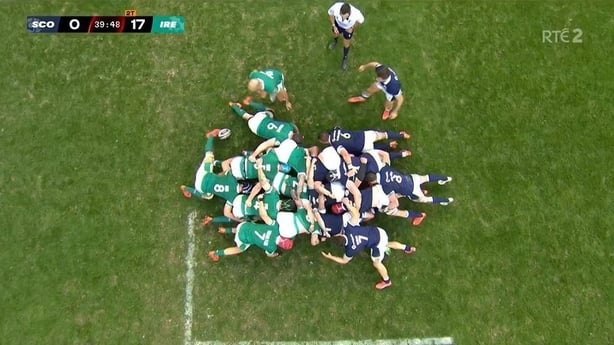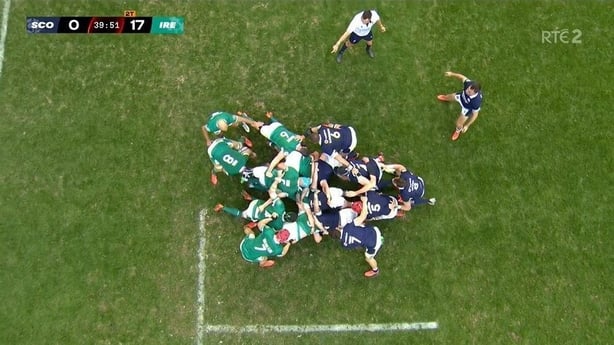The fine margins that can swing international rugby were well summed up by the final moments of Ireland's first half against Scotland on Sunday.
Simon Easterby’s side had dominated the opening half, cruising into a 17-0 lead that could and should have been even more if they’d taken their chances.
Desperate for something to bring into the changing rooms, Scotland had manufactured a couple of late opportunities in the opening half, but Ireland’s defence was holding them out; James Ryan stole a lineout, and when a penalty offered the Scots another go at the 22, Ireland’s maul stood them up.
With the clock ticking towards the red, Ireland just had to lock out a scrum, run the final few seconds down, and send the ball off the pitch to go in with a 17-point buffer, but it was poorly executed.
Rónan Kelleher didn’t get a clean strike on Jamison Gibson-Park's feed to the scrum, and it traveled a little too wide of what’s known as 'channel one’, with Caelan Doris having to stretch out his left foot to trap the ball.

That minor inconvenience meant the Ireland number 8 was reaching behind him to gather the ball rather than picking it in his stride, allowing Scotland’s openside flanker Rory Darge just enough time to meet him behind the gainline.
Darge won the collision, before Bundee Aki and Robbie Henshaw came in the side of the ruck, giving the hosts a penalty five metres out from which they scored a try, cutting the score to 17-5 as the half-time whistle blew.

That Scottish momentum carried into the second half. Blair Kinghorn tagged on a penalty to make it 17-8 two minutes into the second half, and the home side started to suffocate Ireland.
Jonny Gray stole a lineout, Gibson-Park and Sam Prendergast’s spillages sent Ireland backwards on successive plays, and Henshaw overshot his run on defence to create a hole for Huw Jones and Kinghorn to break through, with the Scotland 15 eventually hauled down by Gibson-Park, who did incredibly well to track back.
From being in a position of dominance just before the break, it was suddenly feeling like a very different game.
The momentum and territory stayed with Scotland through those opening minutes of the second half, and Ireland’s desperation led to an offside for advantage, with Jamie Dobie held up over the line.
Coming back for the penalty under the posts, Scotland had a decision to make: tap over the three points and reduce the gap to six, or put their chips in on going for a try, which could have made it a 17-15 game.
Scotland look 'angry' and have found their energy as they make it a six-point game with a penalty in front of the posts.
— RTÉ Sport (@RTEsport) February 9, 2025
50 Mins: Scotland 11-17 Ireland
📺 Watch on @RTE2 and @RTEPlayer
📻 Listen Sunday sport @RTEradio1
📱 Live updateshttps://t.co/W3lWhHXfsM pic.twitter.com/abeaPx0iju
Speaking after the game, Scotland co-captain Rory Darge defended that decision. Having come from a position where the game was almost out of sight, their logic was that the three points got them back within one score of Ireland.
An old cliche in rugby in situations like this is that the best decision to make is the decision the opposition don't want you to make. Ireland should have conceded a try in the moments prior to Kinghorn making the game 17-11, and as their players stood under the posts watching him line up his kick, they would almost certainly have been relieved to see Gregor Townsend’s side settle for three.
"We knew we needed to get out of that penalty-penalty thing," Peter O’Mahony said after the game.
"To be fair, though, the second one was off a scrum line break, we covered back really, really well."
And the Ireland flanker says limiting the Scots to just three points rather than seven felt like a mini-victory.
"I know Robbie [Henshaw] got his hand in and it ended up being a scrum and they got a penalty off it but on other days that could have been seven points if it wasn't for the effort of some of the guys getting back.
"So that gives you a lift. I was saying under the posts, 'lads, that should have been seven and it was only three'. That gives you a big lift, the effort the lads made to get back," he added.
Scotland did have time on their side, but straight from the restart Matt Fagerson spilled the ball in contact. With territory in Ireland’s favour, it took only three minutes for James Lowe to score, effectively ending any hopes of a Scottish revival.
James Lowe forces the ball down for a try after fending off two Scottish defenders, conversion good. Ireland needed that.
— RTÉ Sport (@RTEsport) February 9, 2025
55 Mins: Scotland 11-24 Ireland
📺 Watch on @RTE2 and @RTEPlayer
📻 Listen Sunday sport @RTEradio1
📱 Live updates - https://t.co/W3lWhHXfsM pic.twitter.com/UfauULe6T3
Just over 10 minutes after one minor Irish error led to some major Scottish momentum, another small moment ultimately had a big impact on the game.
We’ll never know for sure, but if Ireland hadn’t made a mess of those final seconds of the opening half, it’s unlikely that little Scottish revival would ever have materialised. The final score could have been a lot healthier than 32-18.
Similarly, who knows how the second half could have turned had Scotland successfully exited their territory off that restart.
The fine margins matter.
Watch Munster v Scarlets in the URC on Saturday from 4.45pm on RTÉ2 and RTÉ Player







